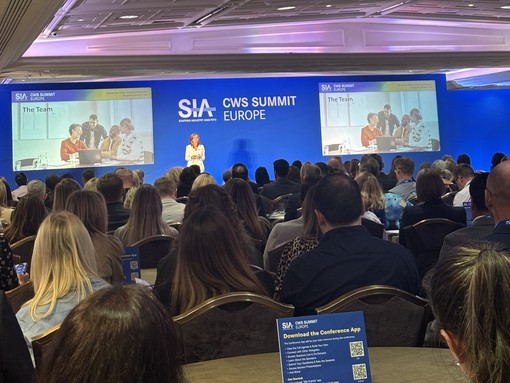
What BBC's The Traitors tells us about workplace teamwork
Contents
Building a team that seamlessly collaborates is paramount for businesses of all shapes and sizes, but finding the right balance of personality traits can be a challenge that’s difficult to master.

BBC’s reality TV series The Traitors pits a group of strangers together to work through various team-based challenges with the aim of winning a cash prize. The twist to the show are the ‘the traitors’, a selection of the group who are chosen from the start to undermine the rest of the team’s progress and actively work, in secret, to ‘pick off’ or ‘murder’ the other players and even recruit other members, the ‘faithful’, to their group. Get it wrong or get spotted in their acts of deception by faithful players, and they risk banishment themselves.
The Traitors can tell us a lot about group psychology and how various personality types adapt to teamwork situations, especially when the ultimate prize can only be won by one of them (or split between however many traitors remain should they win). It can also offer some workplace lessons on how to be a team player – or how to spot those workplace traitors who undermine the collective effort for their own gain.
The Faithful: Good teamwork traits
In a competitive market, soft skills like strong teamwork and communication skills can be a key differentiator between candidates. Here are some of the key stills to look for:
The True Collaborators: Effective Communication
Effective communicators share ideas, actively listen, and align strategies for success. In the workplace, these individuals become true collaborators, fostering an environment where information flows seamlessly and ideas flourish. They not only articulate their thoughts clearly but also adapt their communication style to resonate with diverse audiences, ensuring a shared understanding and promoting a culture of inclusivity.
The Team Players: Building Trust
Trust is the glue that binds successful teams. Team players cultivate trust, allowing for shared responsibilities, mutual support, and the courage to take calculated risks. Their actions build bridges, not only within the team but across the entire organisational structure. This trust becomes the foundation for open and transparent communication, empowering teams to navigate challenges collaboratively and achieve collective goals with resilience and cohesion.
The Agile Navigators: Adaptability
Just like agile navigators on The Traitors, adaptable team members thrive under pressure. In the workplace, they’re the problem-solvers who pivot effortlessly, ensuring the team remains resilient in the face of unexpected challenges.
The Harmony Architects: Shared Goals
Harmony architects understand the importance of shared goals and individual roles. They bring their unique strengths to the team, ensuring a collective symphony that propels the organisation towards its objectives.
The Mediators: Conflict Resolution
Conflict, when handled constructively, becomes an opportunity for growth. Mediators within a team navigate conflicts with finesse, ensuring that disagreements lead to stronger relationships and innovative solutions. They skilfully guide discussions towards resolution, fostering a positive environment where diverse perspectives are valued, and individuals feel heard and understood.
The Team Champions
Team champions don’t just seek personal victories; they celebrate the collective success of the team. Their recognition of shared accomplishments contributes to a positive team culture and reinforces the bonds that hold a team together.

The Traitors: Negative teamwork traits
The Saboteurs: Deceptive Communication
Just as traitors in “The Traitors” deceive their teammates, individuals with poor communication skills sow seeds of confusion. Their actions hinder collaboration, impede progress, and erode trust within the team, sometimes deliberately. This breakdown in communication not only jeopardizes the overall success of the team but also creates an atmosphere of uncertainty, making it challenging for team members to work cohesively towards common goals.
The Doubters: Undermining Trust
Doubters erode trust within a team. Whether through scepticism, unreliability, or a lack of transparency, they become workplace traitors, sabotaging the very foundation upon which successful teams are built. Fostering a culture of open communication and shared goals is essential to counteract the corrosive effects of doubt and ensure a cohesive and thriving team environment
The Stumbling Blocks: Inflexibility
Stumbling blocks in the form of inflexible team members impede progress. Unable to adapt under pressure, they create roadblocks that hinder the team’s ability to navigate challenges effectively.
The Solo Act
Individuals who prioritise personal objectives over shared goals are akin to solo acts within a team. Their lack of commitment to collective success disrupts the harmony required for the team to thrive. In a sense, they play a role akin to contestants on a solo-centric reality show, like “The Solo Pursuit,” where individual achievements overshadow the collaborative spirit necessary for the team’s overall prosperity.
The Credit Hoarders
Somewhat linked to The Solo Act, Credit Hoarders fail to acknowledge team efforts, consistently seeking personal recognition. This trait mirrors the betrayal of the traitors in the gameshow, hindering the development of a positive team culture.
The Agitators
Agitators within a team engage in destructive conflict resolution. Rather than contributing to solutions, they escalate tensions, creating a toxic environment that hampers teamwork. Their disruptive behaviour not only hinders progress but also erodes trust among team members, making it essential for effective leadership to address and redirect their energies towards collaborative problem-solving.
As a recruitment company, identifying and steering clear of individuals who exhibit traits akin to “The Traitors” is crucial for building high-functioning teams. In the workplace, those who lack effective communication, undermine trust, resist adaptation, prioritise personal goals, engage in destructive conflict, and fail to celebrate collective success can be considered workplace traitors. By focusing on recruiting individuals who embody the positive traits of effective teamwork, recruitment companies can ensure that their teams are not only productive but also resilient and collaborative, ready to tackle any challenge that comes their way.
When you think of the most creative team in the workplace, is the first one you think of in finance, or facilities management? The answer is almost certain no, but that shouldn’t be the case. Find out more about how unleashing creativity can boost job satisfaction here
















